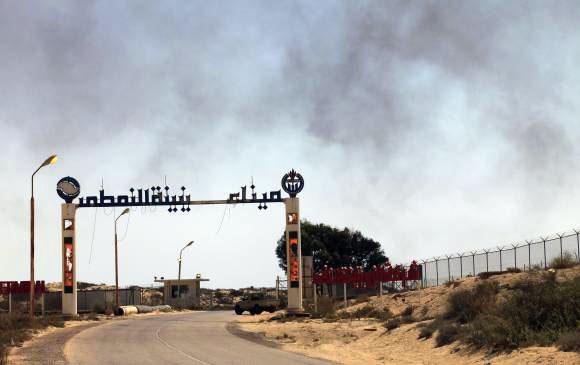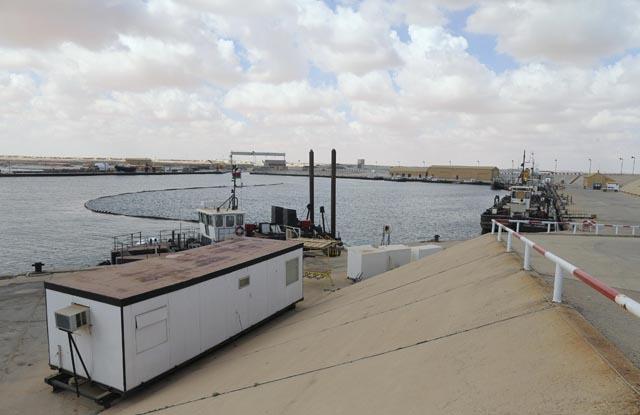You are here
Libya threatens to bomb North Korean tanker if it ships oil from rebel port
By Reuters - Mar 08,2014 - Last updated at Mar 08,2014

TRIPOLI — Libya threatened on Saturday to bomb a North Korean-flagged tanker if it tried to ship oil from a rebel-controlled port, in a major escalation of a stand-off over the country’s petroleum wealth.
The rebels, who have seized three major Libyan ports since August to press their demands for more autonomy, warned Tripoli against staging an attack to halt the oil sale after the tanker docked at Es Sider export terminal, one of the country’s biggest.
The oil dispute is just one facet of the deepening turmoil in the North African OPEC member, where the government is struggling to control militias who helped topple Muammar Gaddafi in 2011 but kept their weapons and now challenge state authority.
A local television station controlled by protesters showed footage of pro-autonomy rebels holding a lengthy ceremony and slaughtering a camel to celebrate their first oil shipment. In the distance stood a tanker.
Prime Minister Ali Zeidan appeared hours later on television to warn the tanker’s crew. “The tanker will be bombed if it doesn’t follow orders when leaving [the port]. This will be an environmental disaster,” Zeidan said.
“They are now trying to load oil,” he said, denouncing it as a criminal act. Authorities have ordered the arrest of the tanker’s crew.
There was no immediate sign of the country’s armed forces moving towards the port. Analysts say the military, still in training, would struggle to overcome rebels battle-hardened from the eight-month uprising against Gaddafi.
Zeidan acknowledged the army had failed to implement his orders last week to stop the protesters sending reinforcements from their base in Ajdabiyah, west of the regional capital Benghazi, to Es Sider.
“Nothing was done,” Zeidan said, adding that political opponents in parliament were obstructing his government. He said North Korea had asked the ship’s captain to sail away from the port but armed protesters had prevented that.
Abb-Rabbo Albarassi, the eastern autonomy movement’s self-declared prime minister, said Zeidan’s government had failed to meet its demands to share oil wealth, investigate oil corruption and to grant the regional autonomy.
“We tried to reach a deal with the government, but they and parliament ... were too busy with themselves and didn’t even discuss our demands,” he told the televised ceremony.
“If anyone attacks, we will respond to that.”
A successful independent oil shipment would be a blow to the government. Tripoli had said earlier it would destroy tankers trying to buy oil from Ibrahim Jathran, a former anti-Gaddafi rebel who seized the port and two others with thousands of his men in August.
Jathran, who was seen attending the televised ceremony, had commanded a brigade of former rebels paid by the state to protect petroleum facilities. He defected with his troops, however, to take over the ports.
In January, the Libyan navy fired on a Maltese-flagged tanker which it said had tried to load oil from the protesters in Es Sider.
The North Korean-flagged Morning Glory, which was previously flagged in Liberia, had been circling off the Libyan coast for days. It tried to dock at Es Sider on Tuesday, when port workers still loyal to the central government told the crew to turn back.
Storage tanks at Es Sider and other seized ports are full, according to oil sources.
It is extremely unusual for an oil tanker flagged in secretive North Korea to operate in the Mediterranean, shipping sources said.
A spokesman for state-run National Oil Corp said the Morning Glory was owned by a Saudi company. It had changed ownership in the past few weeks and previously been called Gulf Glory, according to a shipping source.
The Saudi embassy in Tripoli said in a statement that the kingdom’s government had nothing to do with the tanker, without saying who owned it.
Protests
Western powers worry Libya will slide into deeper instability or even break apart as the government, paralysed by political battles in parliament, struggles to assert control of a vast country awash with arms and militias.
At a Libya conference this week in Rome, Western countries voiced concern that tensions in Libya could slip out of control in the absence of a functioning political system, and urged the government and rival factions to start talking.
Libya’s government has tried to end a wave of protests at oil ports and fields across the vast desert state that have slashed oil output, the country’s lifeline, to 230,000 barrels per day (bpd), from 1.4 million bpd in July.
Tripoli has held indirect talks with Jathran but his demand for a greater share of oil revenues for the east, like the region had under Gaddafi’s predecessor King Idris, is sensitive for a government that worries this might lead to secession.
Jathran has teamed up with another set of protesters blocking oil exports at the 110,000-bpd Hariga Port in Tobruk, also located in the east.
Libya’s defence minister held talks this week with protesters blocking the 340,000-bpd El Sharara Oilfield in the south but there is no word on whether it will reopen soon.
The protesters, from a tribal minority, want national identity cards and a local council, demands the minister has promised to study.
Related Articles
Libya’s navy and pro-government militias have dispatched boats to a port held by armed protesters to stop a North Korean-flagged tanker from leaving with crude sold without government permission, officials said on Sunday.
Libyan authorities stopped a North Korean-flagged tanker as it left a rebel-held port on Monday with an “illegal” shipment of crude, a military source said.
North Korea on Thursday denied any responsibility for an oil tanker that loaded crude from a Libyan rebel-held port and fled the OPEC member state’s attempt to seize it, saying the vessel that carried its flag was linked to an Egyptian firm.

















